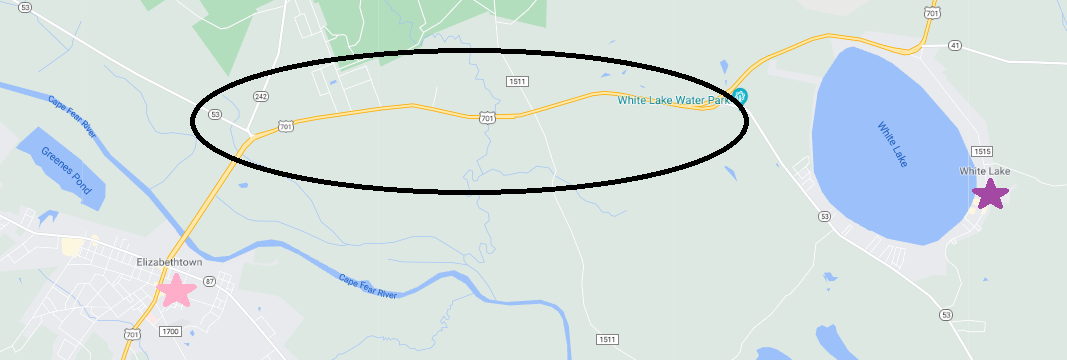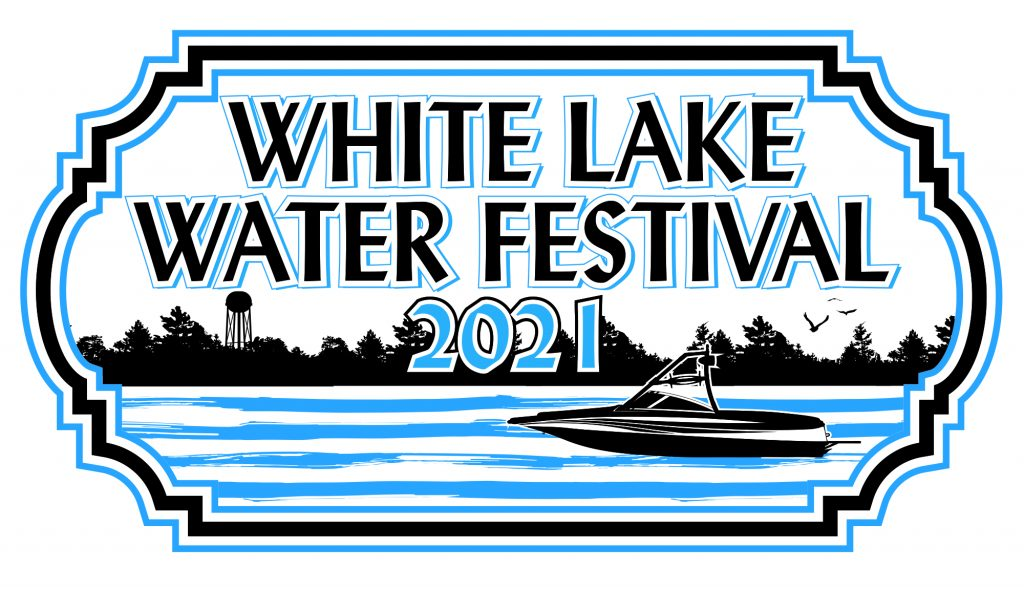Background on White Lake
The Town of White Lake is located in southeast NC on the shores of the town’s namesake body of water. The lake is the town’s main revenue source and supports a $275M tax base for Bladen County.[1] From Memorial Day to Labor Day, White Lake hosts 200,000 visitors who go to White Lake for recreational activities including lake sports, a water park, and golfing. Large seasonal fluctuations in water and wastewater revenues result from the summer spike in White Lake’s population compared to its year round population of just over 800. White Lake’s infrastructure is designed to support these seasonal variations and the town proactively plans and budgets for seasonal revenue fluctuations.
View of White Lake from the Beach. Photo Credit: WWAY News.
White Lake is utilizing a Merger/Regionalization Feasibility (MRF) grant from the Environmental Protection Agency (EPA) to explore outsourcing their wastewater treatment to Elizabethtown. Partnering with Elizabethtown would allow White Lake to focus resources on other aspects of its town infrastructure, such as parks and paths, and would possibly open up the corridor between White Lake and Elizabethtown to economic development.
MRF Grant Overview
The MRF grant program began in 2015 with the objective to promote proactive management and financial viability of water and wastewater systems. Competitive applications must meet criteria in three categories: technical status, organizational status, and affordability.[2] Applications go through the NC Division of Water Infrastructure. The proposed studies must be for a consolidation of two or more systems. Grants are limited to $50,000 over three years and the money comes from the NC State Wastewater and Drinking Water Reserves.[3] White Lake was awarded an MRF grant from the Fall 2020 application cycle.
A Town Exploring Opportunities
White Lake’s growth, both physical and economic, is constrained by lack of space. The limited land left for development is primarily for residential development. Some properties are being revitalized, but White Lake is looking for other ways to expand its economic development. A wastewater partnership with Elizabethtown is a potential way to promote economic development in the region.
 Map showing White Lake (purple star) and Elizabethtown (pink star) with Highway 701 (in yellow) connecting the two towns. The possible development corridor is circled in black. Image from Google Maps.
Map showing White Lake (purple star) and Elizabethtown (pink star) with Highway 701 (in yellow) connecting the two towns. The possible development corridor is circled in black. Image from Google Maps.
Elizabethtown is located 7.5 miles from White Lake and boasts year-round small town charm. White Lake and Elizabethtown have an ongoing positive relationship with mutually beneficial tourism to the area, but no formal utility agreements exist between them. A wastewater partnership could open up the Highway 701 corridor between White Lake and Elizabethtown to economic development that would benefit both communities and Bladen County as a whole. White Lake’s MRF grant is funding a study that explores multiple options for White Lake’s wastewater system with the Elizabethtown partnership as a focus.
White Lake applied for the grant initially with the objective of exploring options that could improve service to customers and enhance economic development. The feasibility study is set to be completed by the end of 2021 and will position White Lake to apply and be ranked higher for grants that prioritize projects which are shown to be feasible. The feasibility study will look at the potential cost and economic impact of White Lake getting out of the wastewater business by pumping waste to Elizabethtown for treatment. Outsourcing waste treatment to Elizabethtown presents an opportunity to increase taps between the towns and attract larger customers on the corridor between the two towns. The partnership is a good opportunity for Elizabethtown to gain customers and keep avenues of future growth open.
The partnership aligns with town and county priorities and with increasing access to federal and state funding for infrastructure improvements, such as American Rescue Plan funding. White Lake also recently brought on its first town administrator to prioritize issues like the MRF study. The MRF study is just beginning so there has not been any public comment so far. In general, White Lake residents seem to support exploring options for the town if the cost to consumers is considered.
Lessons from White Lake
Comprehensive and proactive planning
Comprehensive and proactive planning can protect community resources and open up further opportunities. White Lake officials think about maintaining their main resource, the lake, while promoting economic development and community well-being. This approach prepares the town to take advantage of opportunities, like increased federal funding, when they arise.
Maintain good relationships with neighbors
White Lake was able to obtain the MRF Grant in part because of its good relationship with Elizabethtown. If the towns agree to pursue a wastewater partnership then this healthy relationship will be key to smoothing the transition and securing equitable terms. Good relationships with neighbors can help towns increase their own economic outcomes and financial viability as regions grow together.
Could merging or regionalization help your town?
Merging/regionalization can be done at different scales from full contracting out to just outsourcing parts of system operations or maintenance. For systems with small customer bases who may find it hard to maintain affordability as well as financial viability and infrastructure, merging and regionalization could make sense. If there is a system nearby that has the capacity to take on some or all of a town’s water or wastewater needs, then the partnership could be mutually beneficial. One town is relieved of the strain of operating a system while the other increases its customer base.
If your town is thinking about merging or regionalization: Apply for an MRF grant
An MRF grant looks at different possibilities for towns and helps local leaders decide if the merger/regionalization will be feasible and beneficial. Completing a feasibility study can make a town more competitive for future grants and loans that can fund the actual merging/regionalization process.
White Lake Moving Ahead
Hopefully, White Lake is in the midst of a bountiful summer season, bouncing back from the pandemic and preparing itself for economic development, of which the MRF grant may prove to be a key factor. White Lake’s continual exploration of wastewater options for the town and investment in infrastructure shows how proactive planning can promote financial viability of a small system and economic development for a town.
Acknowledgements
We would like to thank Sean Martin, White Lake’s town administrator, for his time and the information he provided which was vital to creating this case study.
Written by Catherine E. Otero
Catherine Otero joined the EFC as a graduate assistant for summer 2021. She is working on case studies of small water/sewer systems to provide best practices for maintaining financial viability. She received her B.S. in Wildlife Biology from Colorado State University and is now in a dual-Master’s program in Public Policy and Environmental Management at Duke University.
Editorial Assistance by Elsemarie Mullins, Shadi Eskaf, and Kimberly Kirkhart
Funding from Division of Water Infrastructure of the North Carolina Department of Environmental Quality
[1] Wooten, A. (2001, January). “Martin excited, looking forward to being White Lake’s town administrator.” Bladen Journal. [2] Application Forms and Additional Resources: MRF. North Carolina Department of Environmental Quality. Last Updated July 27, 2020. [3] Merger/Regionalization Feasibility Grants. North Carolina Department of Environmental Quality. 2021.




One Response to “On the Shores of Financial Stability: White Lake, North Carolina”
gamer
nice
i like this blog =)